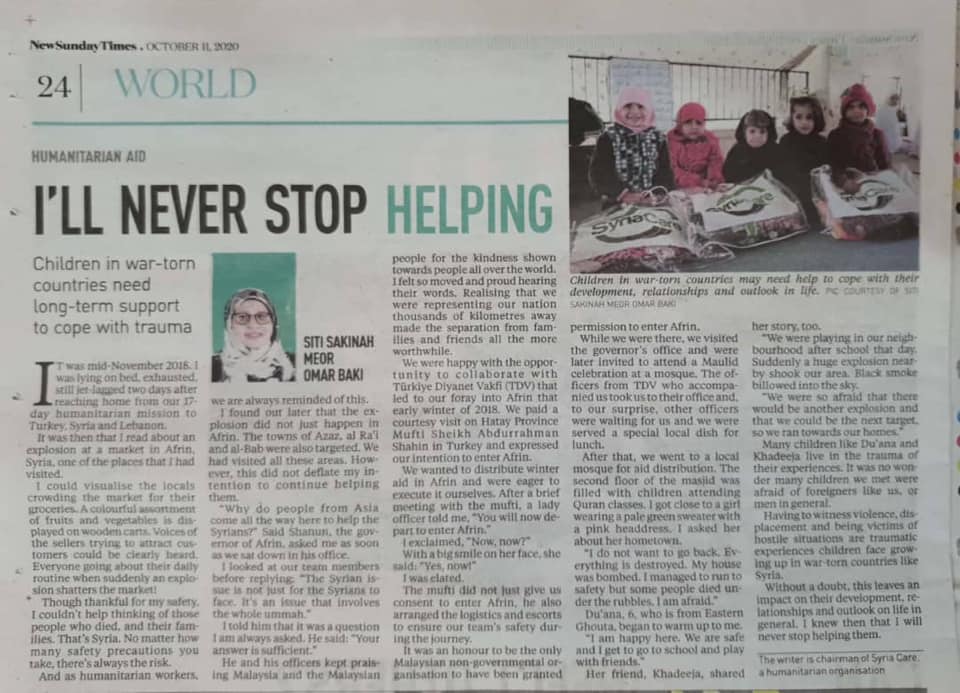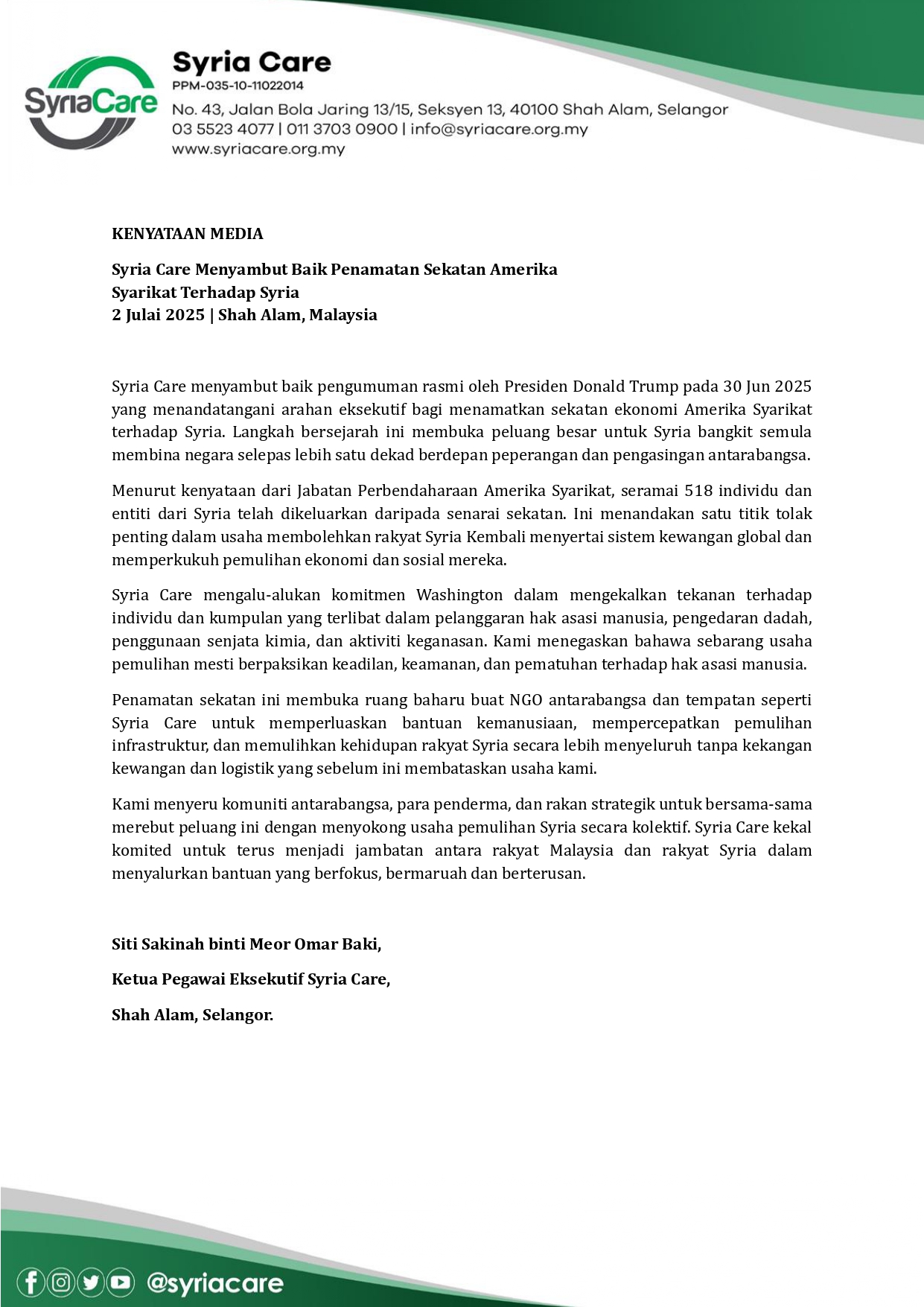It was mid-November 2018. I was lying on the bed exhausted, still jet-lagged as it had only been two days since we got home from our seventeen-day humanitarian mission to Turkey, Syria, and Lebanon. It was then that I read about the explosion that had happened at a market in Afrin, Syria. I became agitated.
My heart began to pound as the image of the market flashed across my mind. I was there just a few days before we returned. Thus I could clearly visualize the whole scenario of locals crowding the market for their daily groceries.
A colorful assortment of fruits and vegetables were displayed on wooden carts. Voices from the sellers trying to attract customers could be clearly heard. Everyone going on their daily routines not expecting anything to occur when suddenly the opposite happens. An explosion shattered the market!
I immediately sat up and found myself perspiring. I thought to myself what if the incident happened during our visit? Would I still be alive? Could I have been wounded? I breathed a sigh of relief. Thankful for my safety yet I couldn’t help thinking of those people who died and their families.
That is Syria. No matter how many safety precautions you take, there is always the risk. And as humanitarian workers, we are always reminded of this fact. But we have our mindset on helping the most vulnerable there and face any challenges ahead with positive attitudes.
I found out later the explosions did not just happen in Afrin. Azaz, al Ra’i, and al-Bab were also targeted. All of these areas were included in our recent series of visits. But somehow this did not deflate my intentions to continue helping them. My love for them and my passion for doing what I do is indescribable.
“Why do people from Asia come all the way here to help the Syrians?” Mr. Said Shanun the Governor of Afrin asked me as soon as we sat down in his office. I looked towards our team members hoping that someone would step forward to answer but only received blank expressions. Sigh…I had no other options. As the only Arabic speaking member, I knew it was on me.
“The Syrian issue is not just for the Syrians to face. It’s an issue that involves the whole ummah”. I told him confidently. It’s a question I am always asked.
I had intended to continue but the Governor said “ Your answer is sufficient”. Wow, that was a relief! I was starting to feel I was in a job interview.
Mr. Said a Turkish nationality, kept saying how grateful he is to be of service to the Syrian people. Despite his high rank, he is such a humble person. He did not even want his photo taken. Together with his officers, they kept praising Malaysia and the Malaysian people for the kindness they have shown towards people all over the world.
I felt so moved and proud at the same time by their words. Realizing that we are representing our nation thousands of kilometers away makes the separation from families and friends all worthwhile.
We felt very happy for the opportunity and chance to collaborate with Türkiye Diyanet Vakfı (TDV) that led to our entrance into Afrin that early winter of 2018. We had paid a courtesy visit The Mufti of Hatay Province, Sheikh Abdurrahman Shahin earlier that morning and expressed our intentions to enter Afrin. We distribute winter aid in Afrin and was eager to monitor the distributions.
After a brief meeting with the Mufti, a lady officer said to me in Arabic, “You will depart now to enter Afrin”. I was surprised and excited all at the same time because I did not expect it to be on that day. I exclaimed “Now, now?” And with a big smile on her face she said, “Yes, now now!”. We were so happy and grateful.
It happened that the Mufti did not just give his consent for us to enter Afrin. He had also arranged all logistics and escort for our team throughout the journey. It was such an honor knowing were the only Malaysian NGOs that were given permission to enter Afrin!
Afrin at that time had just been liberated from the PKK/YPG by Turkey’s Operation Olive Branch aimed to eliminate them and Daesh’s presence which was considered a threat to Turkey. So it was not surprising we had to go through many checkpoints and very thorough inspections before reaching the borders.
And while we were there we had the opportunity to visit the Governer’s office and later were invited to attend a Maulid celebration at one of the masjids. The officers from Türkiye Diyanet Vakfı (TDV) who accompanied us brought us to their office and to our surprise other officers were waiting for us and we were served a special local dish for lunch.
After lunch we went to one of the local masjids for distribution. The second floor of the masjid was filled with children attending Quran classes in small groups. We approached each group and presented each child with gifts of winter attire and was welcomed with beaming faces that lit up on that cold winter day.
I got close to a girl wearing a pale green sweater with a pink headdress. Blessed to be able to converse in their dialect I asked her of her left home town.
“I do not want to go back. Everything is destroyed. My house was bombed. I managed to run to safety but some people died under the rubbles. I am afraid” Du’ana, six years old from Eastern Ghouta told me. “I am happy here. We are safe and I get to go to school and play with friends” she added.
Her friend Khadeeja who was standing next to Du’ana shared her story too. “We were playing in our neighborhood after school that day. Suddenly our area was shaken by a huge explosion nearby. Black smoke raised to the sky. We were so afraid that there would be another explosion and we could be the next target so we ran towards our home”.
Many children like Du’ana and Khadeeja live in the trauma of their past experiences. It is no wonder many children we meet look afraid of seeing foreigners like us or men in general.
Having to witness violence, displacement, and being victims of hostile situations are some of the traumatic experiences children face growing up in war-torn countries like Syria. Without a doubt, this leaves an impact on their development, their relationships with others, and their outlook on life in general.
I knew then I cannot stop helping them.
Siti Sakinah Meor Omar Baki,
CEO Syria Care




![Kenyataan Media Syria Menuju Masa Depan Lebih Stabil Dengan Gabungan Sdf & Kerajaan Baru[1] Page 0001](https://syriacare.org.my/wp-content/uploads/2025/03/KENYATAAN-MEDIA-SYRIA-MENUJU-MASA-DEPAN-LEBIH-STABIL-DENGAN-GABUNGAN-SDF-KERAJAAN-BARU1_page-0001-scaled.jpg)